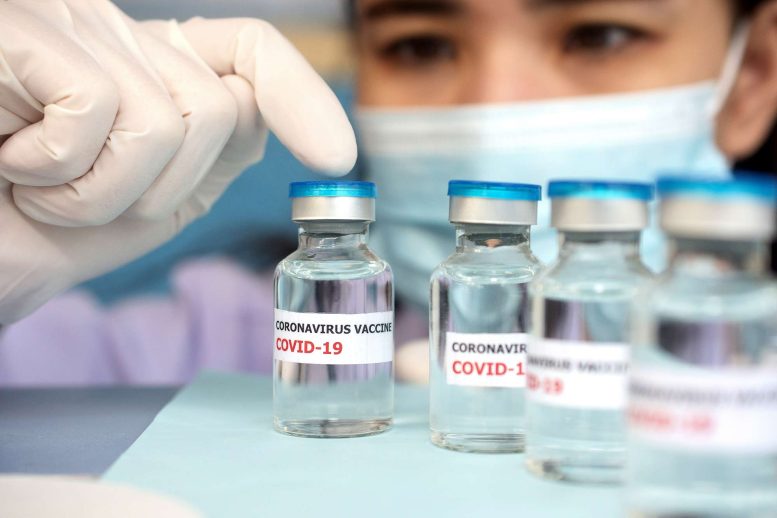
A team of University of Michigan researchers analyzed over 80 studies to assess the effectiveness of COVID-19 vaccine doses beyond the primary series. Their findings, based on 150 million patient observations, support the efficacy of both monovalent and bivalent boosters in preventing severe outcomes and underline the importance of annual vaccine updates.
New research highlighted the significant benefits of monovalent and bivalent COVID-19 boosters in preventing hospitalization and death, advocating for the periodic update of vaccines to match circulating virus variants.
First boosters, second boosters, monovalent, bivalent. Just like the SARS-CoV-2 virus strain, the vaccines to combat the virus are always changing—and perhaps confusing.
With the goal of better understanding the variety of vaccines, their effectiveness and taking a look at the methods used globally to study vaccines’ effectiveness, a group of University of Michigan researchers, led by Sabir Meah and Bhramar Mukherjee, evaluated some 80 studies and 150 million observations from patient datasets across the world to understand the various designs and methods that were used to study effectiveness of COVID-19 vaccine doses following the primary series vaccination.
They then applied all the methods used in those studies to patient data from Michigan Medicine.
Meah is a School of Public Health alumnus with a master’s degree in Biostatistics and currently a biostatistician in Urology at Michigan Medicine. Mukherjee is the John D. Kalbfleish Distinguished University Professor of Biostatistics, the Sioban Harlow Collegiate Professor of Public Health, and assistant vice president for research in the Office of the Vice President for Research.
“What we have been able to create is a repository of methods that can be applied for future annual vaccines,” Mukherjee said. “It is important to have robust and reproducible results and reliable estimates of vaccine effectiveness to solidify public trust and fight misinformation.”
Their full study is available in Science Advances. Meah explains more.
From the patient data you reviewed, could you explain your findings around bivalent and monovalent boosters?
In our study, we evaluated three different vaccination regimens: 1) the monovalent booster targeting the original strain, 2) the second monovalent booster also with the original formulation, and 3) the new bivalent vaccine updated in fall 2022 to target newer Omicron variants. We saw that all sequential doses provided a substantial benefit in terms of preventing hospitalization and death, and the estimates from the fall 2022 Omicron-specific vaccine dose were stronger from worldwide studies we looked at.
These findings support the practice of periodically updating the COVID-19 vaccines for currently circulating variants. Fortunately, it appears that in the U.S. and many other countries, such as those in the European Union, we will be getting updated COVID-19 vaccines on an annual frequency. The fall 2022 vaccine has already been succeeded by a new updated vaccine in fall 2023, which you can still get now in early 2024, if you haven’t already, targeting the even newer XBB1.5 Omicron variant.
We expect that our conclusions on the utility of updating vaccines should generalize to any updated COVID-19 vaccine, not just the fall 2022 bivalent vaccine, but additional monitoring and study of the real-world effectiveness of an annual vaccine is still necessary, and we hope that the findings of our research can aid these studies. What we have been able to do is to establish an analytic pipeline where researchers can study the vaccine effectiveness of future annual vaccine formulations.
Could you describe what biostatistics brings to the table on this topic?
Biostatistics and epidemiology provide a toolbox for the complex process of evaluating vaccine effectiveness in scientific observational studies. However, there are quite a number of different approaches–both in study design and methods that researchers have employed in vaccine effectiveness studies conducted all over the world, which is what motivated us to conduct our review of their methodology and results and subsequent case study of these methods using Michigan Medicine data.
Quite fortunately, a key finding of our study was that vaccine effectiveness estimates remain relatively stable and do not depend heavily on choice of methods for the outcomes of hospitalization and mortality. We did not observe this advantageous property for infection outcomes, but hospitalization and death are arguably much more important points of study as we advance further into the endemic stage of the pandemic.
Given what your research says about the power of COVID-19 boosters to prevent severe illness and hospitalization, what would you like this study to convey to the public?
COVID-19 vaccines examined in our study, including the fall 2022 bivalent vaccine, provided strong protection against hospitalization and death. We expect this pattern to continue with additional annual vaccines approved by the FDA, but continued study of future vaccines is warranted, and our findings provide some important points of consideration for these future studies.
Reference: “Design and analysis heterogeneity in observational studies of COVID-19 booster effectiveness: A review and case study” by Sabir Meah, Xu Shi, Lars G. Fritsche, Maxwell Salvatore, Abram Wagner, Emily T. Martin and Bhramar Mukherjee, 20 December 2023, Science Advances.
DOI: 10.1126/sciadv.adj3747
Co-authors: Xu Shi, Lars Fritsche, Maxwell Salvatore, Abram Wagner, Emily Martin, all of U-M. Their cross-discipline collaboration is part of the School of Public Health’s IDEAS, Interdisciplinary Discovery, Engagement + Actions for Society initiative.









There were literally zero statistics in this article to support their hypothesis. Zero.
The study linked at the bottom (which the article is based on) has the statistical analysis. Steven Hawking had an anecdote, where he was told every equation he added to his book would halve the sales. I don’t begrudge simply written articles, but I often find myself skimming them to get to the study.
When I first read the Moderna and Pfizer studies, I was so impressed by the effectiveness. Within a brief time, I was saddened to see expected mutations destroying that effectiveness. The statistics in this study catalogue that heartbreak as vaccine effectiveness crashes through the floor. Of course I was horrified to see the public policy response, forcing more boosters of an obsolete vaccine for effectively a new virus, but people will have to read the study to form their own conclusions. Even the conclusions of this study itself used unscientific euphemisms like “different”, “fragile protection”, and “jury is still out”, and the study only tracked terrible effectiveness up to a pathetic maximum of three months after vaccination, but I understand as honest researchers are walking on broken glass eggshells here.
Needless to say, that while I disagree with the recommendations in the article, that’s unimportant when the study itself shows the recommendations are unfounded.
+1
To all vaccine skeptics and deniers – Please provide a sworn, notarized, and published directive that you will under no circumstances seek hospitalization should you acquire the virus.
Well Martin, I had it and did not seek hospitalization. No need to notarize or publish anything. It’s a virus, like thousands of others, and is 99.4% survivable in the general population. Comorbidities were the main cause of folks that caught it not surviving.
So you go ahead and get every new shot they come out with. That is your choice and your right. I will pass on all of them.
Survivability is not the issue for most people. People don’t like getting sick and that’s especially true of things that leave lasting damage or that might have very long recovery times, such as long Covid. Few people these days take the vaccine because they think they might die if they don’t. People don’t want to get sick, and the vaccine does a good job of curtailing or preventing it.
You just keep you fully vaxxed and boosted, don’t you worry about anyone else.
I live in a country without any national healthcare, so the more people get sick, the more it potentially affects my insurance costs.
I know people from the industry, I was told that vaccines are for depopulation..which turned out to be true..people who take boosters, go to hospitals and finally die..the unvaccinated go on, alive and well..after this article I start to doubt everyone else you post here..i think i get what you guys are up to..you can’t turn off the light!
Health care is a business, long enough history of mis calculations on the deployment of vaccines and medications